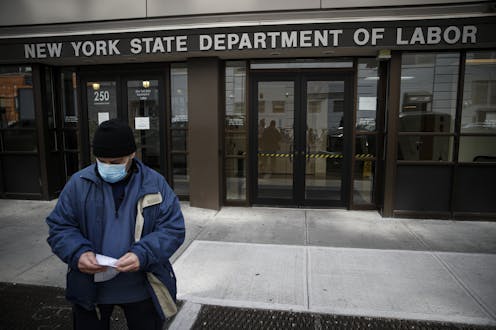Pandemic hardship is about to get a lot worse for millions of out-of-work Americans
- Written by Jeffrey Kucik, Associate Professor of Political Science, University of Arizona

Millions of unemployed Americans are set to lose pandemic-related jobless benefits after Labor Day – just as surging cases of coronavirus slow the pace of hiring[1].
In all, an estimated 8.8 million people[2] will stop receiving unemployment insurance beginning on Sept. 6, 2021. An additional 4.5 million will no longer get the extra US$300 a week the federal government has been providing to supplement state benefits.
But with the pandemic still raging[3] thanks to the rise of the delta variant, particularly in Southern states, the expiration of these benefits seems ill-timed. While some claim that the aid is no longer needed and doing more harm than good, we believe[4] that the data tell another story.
Benefits lost
Three federal programs created to support workers hurt by the COVID-19 pandemic and related lockdowns expire on Sept. 6:
All told, the end of these programs may affect 35 million people[5] when you include families of the unemployed.
Dropping aid didn’t boost jobs growth
Critics of these federal supplemental benefits claim[6] they reward Americans for not working by offering more in aid than they’d get from a job. This is why many Republican governors opted to drop out[7] of one or more of the federal programs in recent months.
“We see ‘Help Wanted’ signs everywhere,” Idaho Republican Gov. Brad Little said[8] on May 11, 2021. “We do not want people on unemployment. We want people working.”
But the data we have so far simply doesn’t back up these claims.
We compared employment growth in the 25 states that decided to drop the federal $300 supplement with those that kept it.
Total job creation in states that kept offering the federal supplement was 35% higher[9] than in the ones that ended the program, according to the Bureau of Labor Statistics, suggesting the benefits aren’t keeping workers on the sidelines.
The same pattern holds for sectors of the economy hit hardest by COVID-19. Leisure and hospitality jobs, such as waitstaff and cooks, accounted for roughly 1 in 4[10] of all jobs lost in 2020. Hiring in those areas was 39% higher in July[11] 2021 in states that kept the federal benefit.
This is consistent with a growing[12] number[13] of studies[14] that show no correlation between the higher unemployment payments during the pandemic and lagging job growth.
We won’t know whether the trend continued until the state-by-state employment breakdown is released in mid-September. But for now, the evidence doesn’t support the claim that benefits keep folks at home.
Jobless Americans still need support
But we do know that people who want to work are still being prevented from doing so because of COVID-19.
The latest jobs report[15], released on Sept. 3, 2021, showed that 5.6 million people were unable to work in August because their employer closed or lost business because of the pandemic, up from 5.2 million in July.
That may help explain why companies hired only 235,000 in August – a third of what economists had expected[16]. And there were no gains in leisure and hospitality, which pay some of the lowest wages of any industry[17].
As recently as late May, before the delta variant began causing caseloads to climb[18], pandemic-related unemployment claims were falling across all 50 states. Then, over June and July, claims spiked[19] again as COVID-19 cases rippled across the country.
All this shows why all three programs are still so important.
The extended benefits give unemployed people more time to find a job while helping them cover basic expenses. Gig workers, like Uber drivers and other independent contractors, need unemployment benefits too, especially as 60% of them lost income during the pandemic[20] and many continue to struggle as business activity remains subdued. These workers are also less likely[21] to receive employer-sponsored benefits like health care.
And the $300 federal supplement is important because pre-pandemic state benefits – which are typically about $340 a week[22] – replaced only 30% to 50% of lost earnings[23]. Even with the supplement, for most people, it’s still less than what they were earning from their job.
Tough choices ahead
That’s why the expiring benefits mean so much to lower-income families, especially now that the Supreme Court has struck down[24] the Centers for Disease Control and Prevention’s ban on evictions.
For many, losing the benefit could be the difference between choosing[25] to pay for food or rent, or forgoing a doctor’s visit because of the high costs[26] of health care.
But after the benefits expire on Labor Day, making ends meet and staying in their homes will be significantly harder for millions of American families.
[Over 110,000 readers rely on The Conversation’s newsletter to understand the world. Sign up today[27].]
References
- ^ slow the pace of hiring (www.bls.gov)
- ^ estimated 8.8 million people (www.cnbc.com)
- ^ pandemic still raging (www.nytimes.com)
- ^ believe (clas.osu.edu)
- ^ may affect 35 million people (www.peoplespolicyproject.org)
- ^ Critics of these federal supplemental benefits claim (www.wsj.com)
- ^ opted to drop out (www.cnn.com)
- ^ Idaho Republican Gov. Brad Little said (gov.idaho.gov)
- ^ was 35% higher (www.bls.gov)
- ^ roughly 1 in 4 (www.bls.gov)
- ^ was 39% higher in July (www.bls.gov)
- ^ growing (news.yale.edu)
- ^ number (www.cnbc.com)
- ^ studies (www.cnbc.com)
- ^ latest jobs report (www.bls.gov)
- ^ a third of what economists had expected (www.bloomberg.com)
- ^ pay some of the lowest wages of any industry (www.bls.gov)
- ^ delta variant began causing caseloads to climb (www.science.org)
- ^ claims spiked (oui.doleta.gov)
- ^ 60% of them lost income during the pandemic (www.prnewswire.com)
- ^ less likely (hbr.org)
- ^ $340 a week (www.cnbc.com)
- ^ replaced only 30% to 50% of lost earnings (www.nber.org)
- ^ Supreme Court has struck down (theconversation.com)
- ^ be the difference between choosing (www.cbpp.org)
- ^ high costs (www.cnbc.com)
- ^ Sign up today (theconversation.com)

















